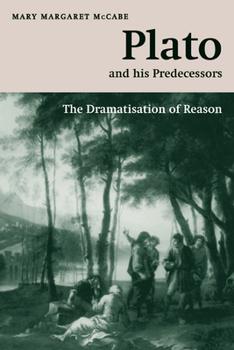Plato and His Predecessors: The Dramatisation of Reason
(Part of the The W. B. Stanford Memorial Lectures Series)
Select Format
Select Condition 
Book Overview
How does Plato view his philosophical antecedents? Plato and his Predecessors considers how Plato represents his philosophical predecessors in a late quartet of dialogues: the Theaetetus, the Sophist, the Politicus and the Philebus. Why is it that the sophist Protagoras, or the monist Parmenides, or the advocate of flux, Heraclitus, are so important in these dialogues? And why are they represented as such shadowy figures, barely present at their own...
Format:Paperback
Language:English
ISBN:0521033799
ISBN13:9780521033794
Release Date:March 2007
Publisher:Cambridge University Press
Length:328 Pages
Weight:1.06 lbs.
Dimensions:0.7" x 6.0" x 9.0"
Customer Reviews
0 rating





